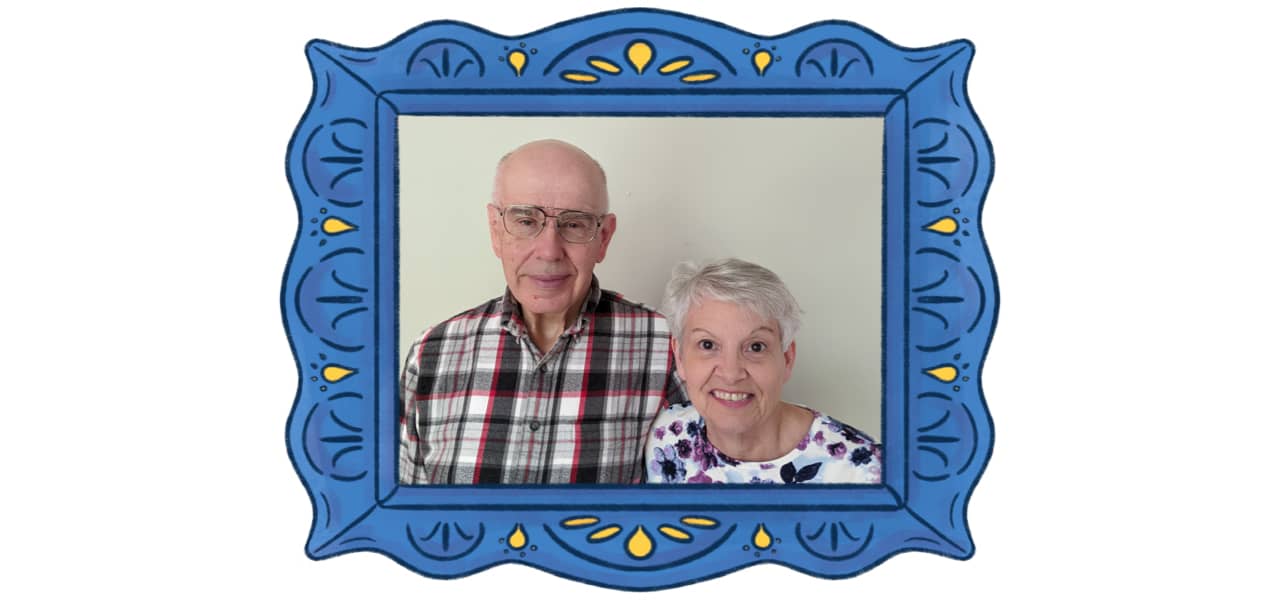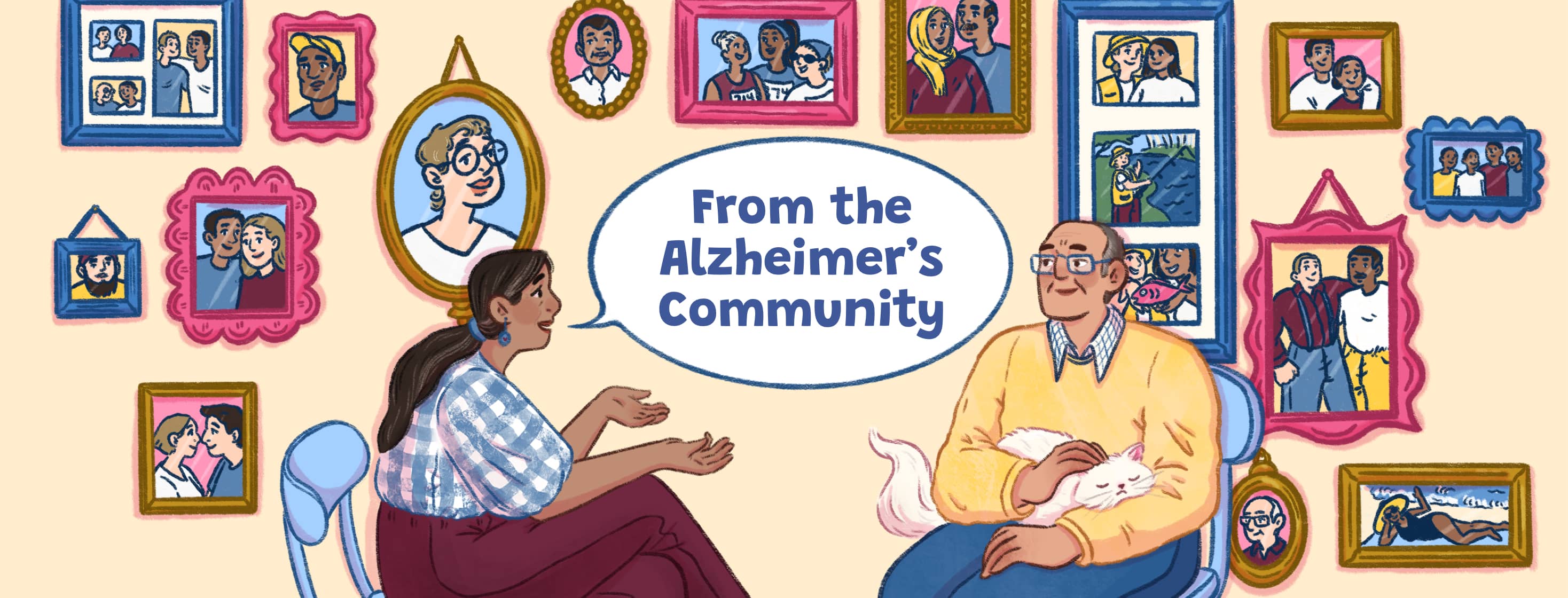Living With Alzheimer's: My Story
Kris Bakowski was diagnosed with early-onset Alzheimer's disease at 46 years old. Since her diagnosis, she has been an active advocate for those living with the disease. Kris has written many articles for AlzheimersDisease.net, sharing her experiences living with Alzheimer's to help others.
Recently Kris shared her experience living with Alzheimer's disease, how life has changed since her diagnosis, and what others should know.
How do you keep communication open with your care partner?
My husband is my care partner, and he often can see that I am struggling with certain things. He usually asks if I need help, and if I can't convey that to him, he will pitch in.
I have had to learn to ask for help as well. Asking for help is hard, but I have come to terms with it. We keep a large calendar on our wall and a to-do list. We add things to it as we think of them. Either at night or in the morning, we go over our schedules for the day to see if I am going to need assistance with anything.

How has life changed since being diagnosed with Alzheimer's disease?
We have learned to adapt bit by bit over the years, so when people ask me how my life has changed, I have to think about it because we are adjusting all the time. When we find that I can no longer do things, we try to find a way around it, or I come to accept it and move on.
The power of routine
Routine is very important to me now, and when I get out of my routine, I can become agitated, flustered, and moody. I have had to learn to pace myself. It is hard for me to concentrate for long periods of time, so I find myself doing activities that don't have me tied up for long.
My cognitive ability is stretched every day, and it exhausts me. It is important for me to rest in the afternoons in order to have a productive evening.
Noise is not my friend
I am prone to panic attacks when faced with overstimulation, crowds of people, or noise.
Noise is one of my biggest problems. I carry earplugs with me all the time. I cannot filter out noise very well, so it is very hard for me to be in a car with the radio on or with several people talking at one time. I cannot concentrate with the noise.
The "rules" of engagement
This issue has caused a great deal of change in my life because socializing with others has become difficult. I try workarounds like trying to meet a small group of friends at my house where I can control the environment.
If we go to a restaurant, we have to go early when it is not so busy or loud. I always have to sit at the end of a table, so I am not caught between two people having a conversation. My friends are very accommodating and know the "rules" when we go out.
I enjoy playing pickleball but find myself having to play when there are not many people on adjoining courts if possible. Otherwise, there is too much distraction for me.
I have two beautiful grandchildren, ages two and five. I love to be around them, but the amount of noise they make and the constant attention they need can be a struggle for me. It is important for me not to get stressed out, get plenty of rest, and exercise.
I carry a lot of guilt, which is hard to let go of. I feel I have the easy part, and my family has the hard part of this disease.
Do you feel well supported by your doctors and family?
My family certainly supports me 100 percent. My doctors not so much.
I see my neurologist two times a year. The last appointment was done virtually, and the call lasted exactly 3 minutes and 41 seconds. It was basically, "I have you on the only meds we have. Do you need a refill? Do you have any questions? We'll set up an appointment in six months."
What do you want other people diagnosed with Alzheimer's to know?
To those diagnosed early, please don't take it as an immediate death sentence. I like to say that I am living with Alzheimer's, not dying from it. Enjoy every moment you can.
Help your family help you. Most supportive family members want to help, but if you can give them clues as to what you need help with, they will feel like they are doing something worthwhile. Try to do as much as you can. While it is easy to sit home and hide, try not to let go of your friends and community. Let people in. Don't be ashamed.
Have those hard conversations early
You have an illness. Other people have illnesses, and they don't let it consume them. Sometimes it isn't easy, but friends and family can help you get through it. Try to help your loved ones with hard decisions about finances, last wishes, and care preferences.
When I was diagnosed, I wanted this to all be taken care of so my family didn't have to worry about it down the road. It isn't an easy conversation to have, but it will help everyone involved. It will be something you don't have to worry about.
Relish the joyful moments
Find meaning in your life. Don't give up — continue to live to the best of your ability. Some days will be hard, others harder. But many days will be good. Surround yourself with positive people. Laugh at yourself. Be forgiving. Don't withdraw. Let your friends and family do things for you. Enjoy the moment.
What should caregivers know?
This disease is not easy. The person you are caring for now is not the same person you once knew.
- Don't take offense at things that your loved one might say.
- Ask people for help, even if it is only for a few hours. Take care of yourself.
- Be an advocate for your loved one.
- Admit to others that you might be having a hard time. They will understand.
- Learn your loved ones' triggers as to what might upset them or agitate them so you can try to avoid those triggers.
- Seek help from a support group. If you can't go in person, try to find one online. The Alzheimer's Association has a toll-free number to call 24/7 if you need help. 1-800-272-3900 is the number. This phone line is manned by licensed professionals and is strictly confidential.
Is there anything that you would like to add?
Since my diagnosis, I have been a strong advocate fighting for those suffering from Alzheimer's.
Workplace advocacy
Since I was diagnosed young, I encountered a lot of workplace issues that those being diagnosed later in life did not have to face. Many of these issues still need to be addressed as people are getting diagnosed earlier and earlier.
Improvements are needed to the healthcare system
Our health care system needs to be more cognizant of the ramifications of Alzheimer's disease. Doctors need to be more proactive with their patients. Most of the time, people living with Alzheimer's have other afflictions, such as high blood pressure, diabetes, heart problems, etc. Doctors need to be better at working together to be sure the patient is getting the proper care and that the drugs being prescribed are not interfering with other drugs you may be on. We need a cure. We need to keep fighting.

Join the conversation